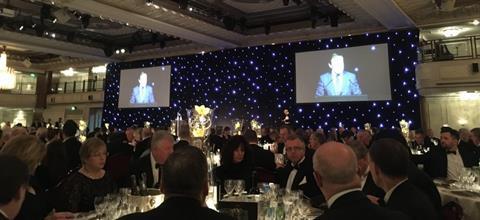The Provision Trade Federation (PTF) hosted its annual black tie dinner on Thursday 9th February at the Grosvenor House Hotel, London.

Defra minister George Eustice attended the event, sharing his views on Brexit and the food sector with PTF members.
Eustice said: “The Provision Trade Federation represents some of the sectors where we’ve got some great opportunities when it comes to trade. Our dairy industry is world class and although it’s been two very difficult years for dairy farmers we have got some great export opportunities like the United States, like Brazil and like China.
“I want to say a little bit about the decision made last June to leave the European Union. The truth is there is no easy way to take really big decisions in life. That’s the same whether you’re expanding your business, whether you’re selling your business, whether you’re getting married or even, for that matter, whether you’re getting divorced. When you take big decisions it makes people feel apprehensive and it’s natural that some people will feel apprehensive as we now embark on this process of leaving the European Union.
“This week marked a major step forward with the House of Commons clearing the bill that authorised the trigger of Article 50, which we plan to do by the end of March. All I can say is that in Defra there is a huge amount of analysis and detailed work that’s being done looking at the opportunities that presents, but also looking at some of the challenges and some of the issues that we need to resolve during that negotiation process.”
Eustice went to on to say a word about trade.
“As the Prime Minister has made clear, we’re going to leave the single market and we’re going to leave the common external tariff but beyond that we are keen to put in place an incredibly close working partnership with our European partners,” he commented.
“We want a very bold, very ambitious and very comprehensive customs agreement so that trade and British business can carry on pretty much as it is now and so that we can still enjoy those very close trading relationships. There are of course other issues that we’ll have to resolve – things like the WTO schedule and how we carve up the various tariff rate quotas on different products.
“Beyond trade there are some really good opportunities in my view to change policy for the better, to think things through from first principles – in the case of agriculture we’ve got a great opportunity to reform what is currently an incredibly bureaucratic policy with lots of deadweight costs and lots of unnecessary administration and to replace it with a brand new policy that’s fit for purpose in the 21st century.
“We’re looking at a whole range of options – from risk management measures to help businesses, initiatives that will help to improve productivity on farms and support investment on farms, to initiatives that concern high animal welfare standards and deal with issues such as antimicrobial resistance and of course locally tailored policies to better deliver for our environment.
“In conclusion, we really look forward to working with industry as we embark this process, as we design post Brexit policy. As I said, we are incredibly keen on putting in place a close working relationship and a close trading relationship with our European partners. I know that as members of the PTF with such a long history in global trade that is something that you will welcome.”

This story was originally published on a previous version of the Meat Management website and so there may be some missing images and formatting issues.















